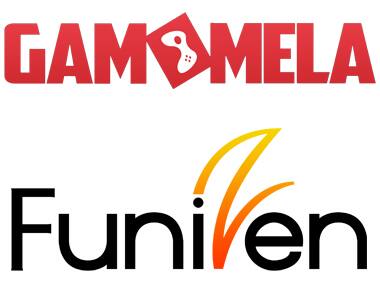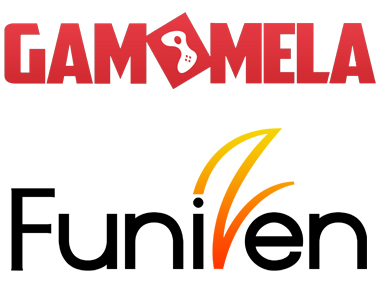It is easier to locate a gaming parlour than an internet café these days. With widespread 3G connectivity in the country, there are few chances that you are looking for an internet café. According to a KPMG and IAMAI survey, India’s smartphone penetration is expected to go up to 314 million mobile internet users by 2017, making the country the third largest smart phone market in the world. That should be a wake-up call for internet café users, not that they haven’t realized the inevitability of the changing trends. Most internet cafes have been selling stationery,phone recharge cards, xerox, printers, etc. for some time now to generate revenues, besides also running the café. [caption id=“attachment_2400392” align=“alignleft” width=“380” class=" “]
 Logo[/caption] Funizen, a firm that has seized the opportunity to herd the crowds back into the cafes to play games was started by a Korean, Chris Lee. The company has found takers for changing internet cafes to gaming parlours in Tier 2 and Tier 3 cities so far where it has converted 3,300 cafés. What it does is that it network and ropes in browsing cafes with cafe management and billing solutions and eventually converts them into gaming cafes. With an over 3,000 network across India in cities as diverse as its population such as Pune, Mumbai, Delhi, Kolkata, Coimbatore, Bengaluru and Chennai, Funizen is planning to push its boundaries to other states. Launched in India in 2008, the company claims to be India’s only online game publishers, besides channeling I-Cafe networking business. Funizen’s Founder and CEO, Lee, who has worked in the gaming divisions of IT firms in Korea and India, decided to go off on his own when he realized that most management of IT firms in India did not pay much attention to the gaming division as, he says,they are not interested in it. Consequently, they were unwilling to make decisions that would enhance the product offerings. “With internet cafes not getting much traction because of the rapid pace of broadband connection, it is time to think about content that will bring in the people back in to these cafes. The picture has changed in small towns in the country. If you go through gaming cafes in India, you will find that they are overcrowded in Tier 2 towns. According to our survey, the user time in the cafes is over five hours. In contrast, people spent just 29 minutes in browsing cafes where they check emails. Usually, they leave in 10 minutes,” informs Lee. The survey by Funizen shows that 73 percent of browsing cafes would prefer to be gaming cafes and earn more revenues but don’t know how to do it. “The young generation does not think twice before spending money for fun. Teenagers are hungry all the time. When a gaming café comes up, a snack joint nearby is inevitable and business can boom. But you need to have vision for that. If you want to go to a gaming café, you have to upgrade your PC. It is one of these problems that shoots up the cost,” explains Lee. Funizen’s Gamemela, the largest e-pin sales site, installs games for the gaming café and provides e pins – a personal identification number which is like cyber currency. As the game arcs to a higher level, e pins can be bought. When more e pins are sold, it translates to higher margins for the café owner. The company got Series A funding from Korea and US. “We are keen to go for the next round and hope to get $10 million. Two companies in the US and Japan have shown keen interest," says Lee. With around 11 payment gateways getting RBI approval, it makes it easier for the online game category to access it, says Lee. “You pay just Rs 15 or Rs 20 for a browsing café and a gaming café. For youngsters, that is affordable.” Funizen has also launched a game, Elsword and conducts gaming tournaments across the country. The company expects to expand its reach to 20,000 cafes by end of next year. “We attained break-even point in the first half of the year. By next year we are hopeful of generating Rs 1 crore in monthly revenues,” Lee said.
Logo[/caption] Funizen, a firm that has seized the opportunity to herd the crowds back into the cafes to play games was started by a Korean, Chris Lee. The company has found takers for changing internet cafes to gaming parlours in Tier 2 and Tier 3 cities so far where it has converted 3,300 cafés. What it does is that it network and ropes in browsing cafes with cafe management and billing solutions and eventually converts them into gaming cafes. With an over 3,000 network across India in cities as diverse as its population such as Pune, Mumbai, Delhi, Kolkata, Coimbatore, Bengaluru and Chennai, Funizen is planning to push its boundaries to other states. Launched in India in 2008, the company claims to be India’s only online game publishers, besides channeling I-Cafe networking business. Funizen’s Founder and CEO, Lee, who has worked in the gaming divisions of IT firms in Korea and India, decided to go off on his own when he realized that most management of IT firms in India did not pay much attention to the gaming division as, he says,they are not interested in it. Consequently, they were unwilling to make decisions that would enhance the product offerings. “With internet cafes not getting much traction because of the rapid pace of broadband connection, it is time to think about content that will bring in the people back in to these cafes. The picture has changed in small towns in the country. If you go through gaming cafes in India, you will find that they are overcrowded in Tier 2 towns. According to our survey, the user time in the cafes is over five hours. In contrast, people spent just 29 minutes in browsing cafes where they check emails. Usually, they leave in 10 minutes,” informs Lee. The survey by Funizen shows that 73 percent of browsing cafes would prefer to be gaming cafes and earn more revenues but don’t know how to do it. “The young generation does not think twice before spending money for fun. Teenagers are hungry all the time. When a gaming café comes up, a snack joint nearby is inevitable and business can boom. But you need to have vision for that. If you want to go to a gaming café, you have to upgrade your PC. It is one of these problems that shoots up the cost,” explains Lee. Funizen’s Gamemela, the largest e-pin sales site, installs games for the gaming café and provides e pins – a personal identification number which is like cyber currency. As the game arcs to a higher level, e pins can be bought. When more e pins are sold, it translates to higher margins for the café owner. The company got Series A funding from Korea and US. “We are keen to go for the next round and hope to get $10 million. Two companies in the US and Japan have shown keen interest," says Lee. With around 11 payment gateways getting RBI approval, it makes it easier for the online game category to access it, says Lee. “You pay just Rs 15 or Rs 20 for a browsing café and a gaming café. For youngsters, that is affordable.” Funizen has also launched a game, Elsword and conducts gaming tournaments across the country. The company expects to expand its reach to 20,000 cafes by end of next year. “We attained break-even point in the first half of the year. By next year we are hopeful of generating Rs 1 crore in monthly revenues,” Lee said.
Funizen plays pioneer in converting Internet cafes to gaming parlours
Sulekha Nair
• August 21, 2015, 15:29:56 IST
A survey undertaken by Funizen shows that 73 percent of browsing cafes would prefer to be gaming cafes and earn more revenues but don’t know how to get there.
Advertisement
)
End of Article